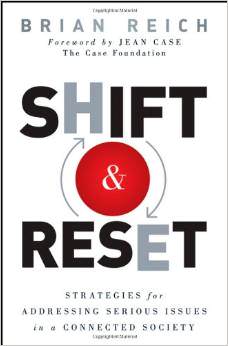“The Old Fashioned Way” No Longer Works

It’s time for more entrepreneurs to reset their focus, and shift their thinking to completely different ways of doing things. Everyone talks about innovation, but the majority of business plans I see still reflect linear thinking – one more social network with improved usability, one more wind-farm energy generator with a few more blades, or one more dating site with a new dimension of compatibility. Serious changes and great successes don’t come from linear thinking.
In searching for ways to get this message out, I came across a no excuse, no apology, new book by Brian Reich, called “Shift and Reset,” which makes some excellent points on ways to increase the range of change in a person’s thinking, or an organization’s results. Although the book targets the non-profit world, the key principles apply to all kinds of organizations:
- Force and expect change. Everyone knows change is hard and messy, and occasionally painful. But unless we force ourselves to change, innovate, and experiment with different ways of addressing serious issues, we won’t find solutions that are needed. Major innovation won’t happen without real commitment, sacrifice, and hard work.
- Measure ability and results, not experience. Move to a model where people are measured on their deliverables, not how hard they are working, or how many years of experience they have. For entrepreneurs, this may mean more learning from experiments, and for organizations, it may mean dumping a stagnant team to start over.
- Don’t settle, demand the best. If you want to perform at the highest possible level, you need to hire the best people, who have produced consistent exceptional results. More energy needs to be spent on how the teams are organized and how the individuals work together. Leading an organization or a movement requires skills not taught in school.
- Launch fast, fail quick, and learn more. Indeed, even the most capable, passionate, and well-supported entrepreneur will succeed only if he or she has a clear plan to follow. But don’t believe that any plan will develop and must remain unchanged throughout the execution process. Plan in your plan for constant change, with learning.
- The time is now to think bigger. Great new ideas are emerging from the massive and frenetic coordination of people online and through connections. Let’s make sure they aren’t lost or ignored as we head into the future. Now is the time when smaller, yet dedicated groups can communicate and work to bring together disparate ideas.
Reich makes the point that everyone has a role to play in solving major issues and driving greater innovation. The Internet and social media facilitates cooperation and collaboration, which is what we need to shift our thinking, then reset our goals and ways of attaining them. It’s much easier to challenge everything we know and turn them on their sides.
Especially for changing serious social issues and infrastructures, it’s now easier to motivate people to care enough and take action. We will never innovate quickly by following the same, old, tired patterns. We need to realize what being connected really means, and makes possible. Now is the time to change.
Innovation begins with knowing your customer, so that’s always the first place to focus. The shift and reset in thinking applies to finding the solution more than in defining the problem. Linear thinking on the solution can doom a startup or an entrepreneur. A good step in the right direction is to build a team with diverse backgrounds and perspectives.
This helps break linear thinking, and greatly reduces the probability that you’ll solve a problem in the same old way, or just like your competitors. Another approach is to bring in team members from outside your domain to challenge your thinking. You as an entrepreneur can either take the lead to make real change happen, watch it happen, or wonder what happened. You decide.
